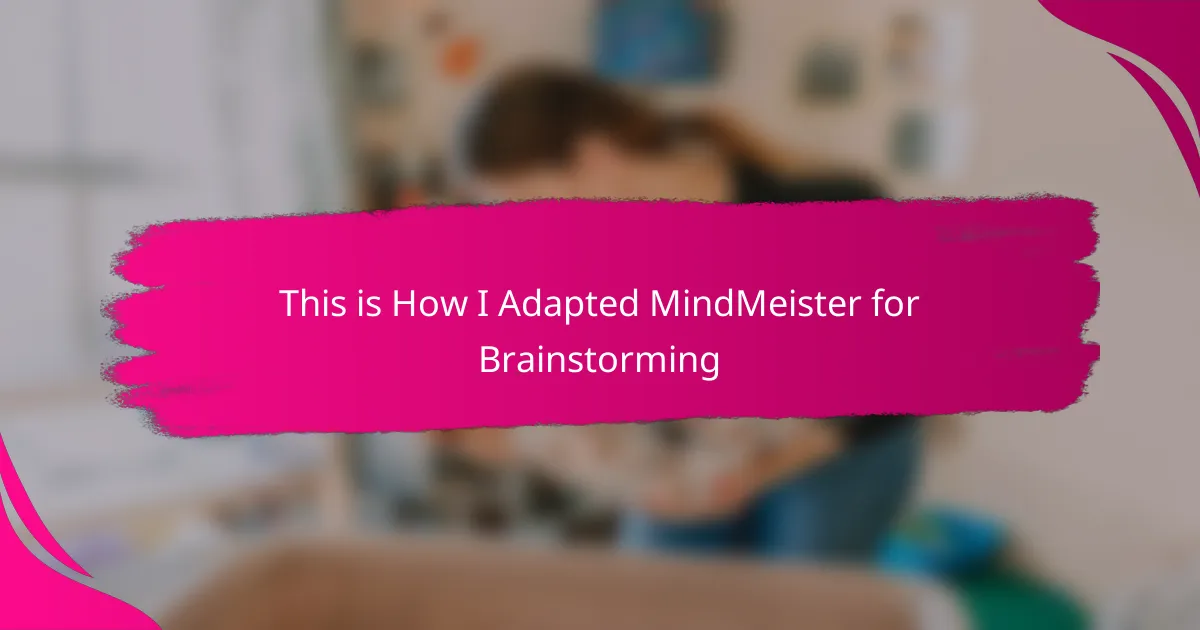Key takeaways
- Mind mapping simplifies parenting by visually organizing thoughts, reducing stress, and aiding in problem-solving.
- MindMeister is an intuitive tool that enhances brainstorming and collaboration, making it easier to manage family tasks and plans.
- Breaking down projects into smaller tasks and using color-coding fosters a sense of accomplishment and clarity.
- Flexibility and emotional awareness in planning enhance the parenting experience, helping to tackle challenges more effectively.
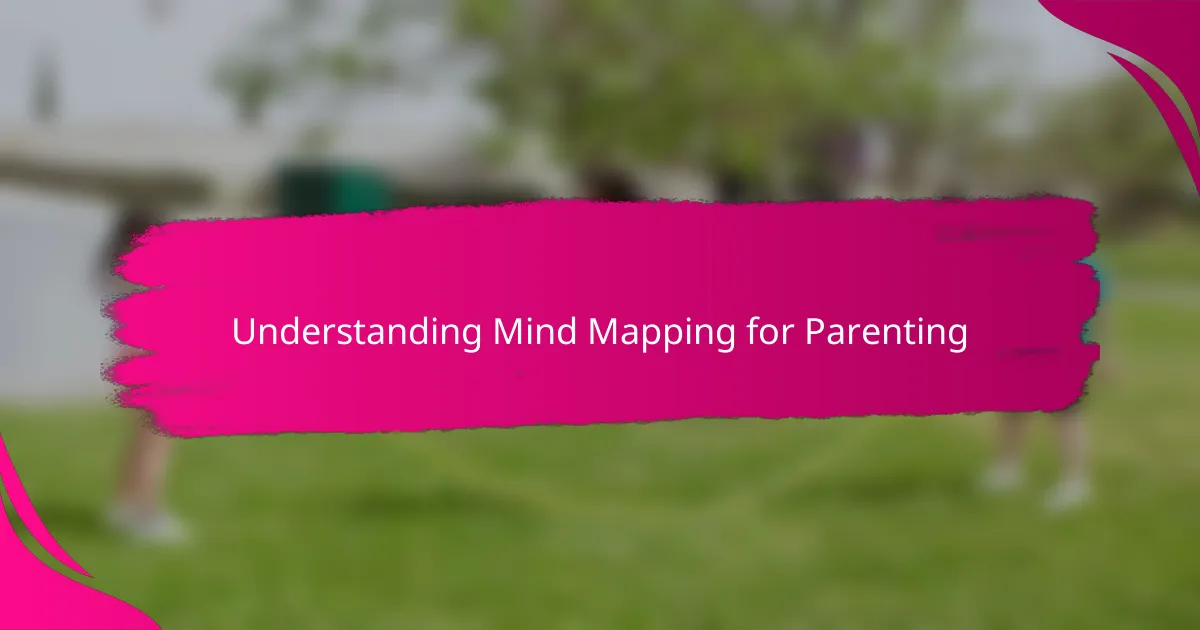
Understanding Mind Mapping for Parenting
Mind mapping, to me, feels like untangling the jumble of thoughts that swirl in a parent’s mind. Have you ever found yourself overwhelmed by all the little decisions, plans, and worries that come with raising children? Using a mind map helps me lay everything out visually, making those swirling ideas clearer and easier to manage.
When I started mapping out my family’s routines and goals, I noticed how much less stressful it was to tackle daily challenges. Instead of juggling everything in my head, I could see connections and priorities right in front of me. This simple shift not only organized my thoughts but also made problem-solving feel more approachable.
I often wonder: why do we tend to overlook tools like mind mapping in parenting? Maybe it’s because caring for kids feels so instinctive that we forget the power of visualizing our ideas. Yet, mapping has shown me that turning mental clutter into clear plans can bring surprising calm and confidence to parenting.
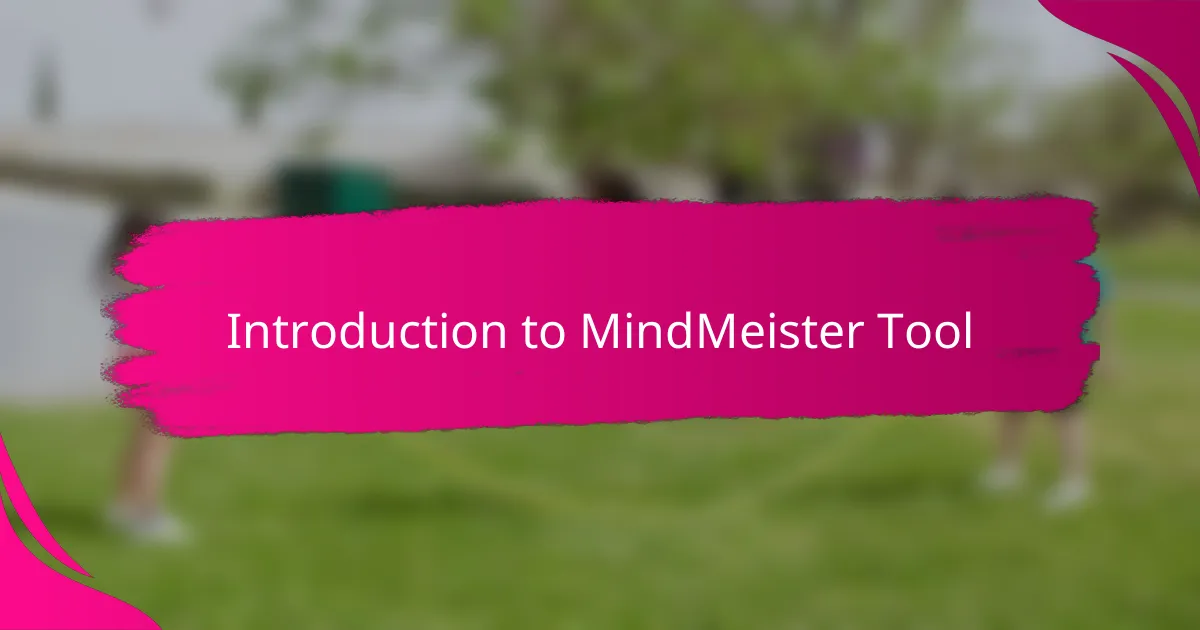
Introduction to MindMeister Tool
MindMeister quickly became my go-to tool when I wanted to harness the power of mind mapping without the hassle of paper and pens scattered everywhere. Have you ever tried to capture a sudden parenting idea only to lose it in a sea of sticky notes? MindMeister’s digital interface felt like a lifeline, letting me capture thoughts the moment inspiration struck.
What stood out to me was how intuitive the platform is—dragging branches, adding colors, even including images made my brainstorming sessions almost fun. It’s not just about organization; it’s about creating a space where ideas flow freely and grow naturally. That ease made me want to keep refining my plans instead of abandoning them halfway.
I can’t tell you how many times I’ve relied on MindMeister to juggle everything from meal prep schedules to milestone tracking. The seamless syncing across devices meant I could brainstorm during nap time, school runs, or whenever a sudden parenting challenge popped up. Isn’t it amazing when technology actually understands the chaotic rhythm of parenting?
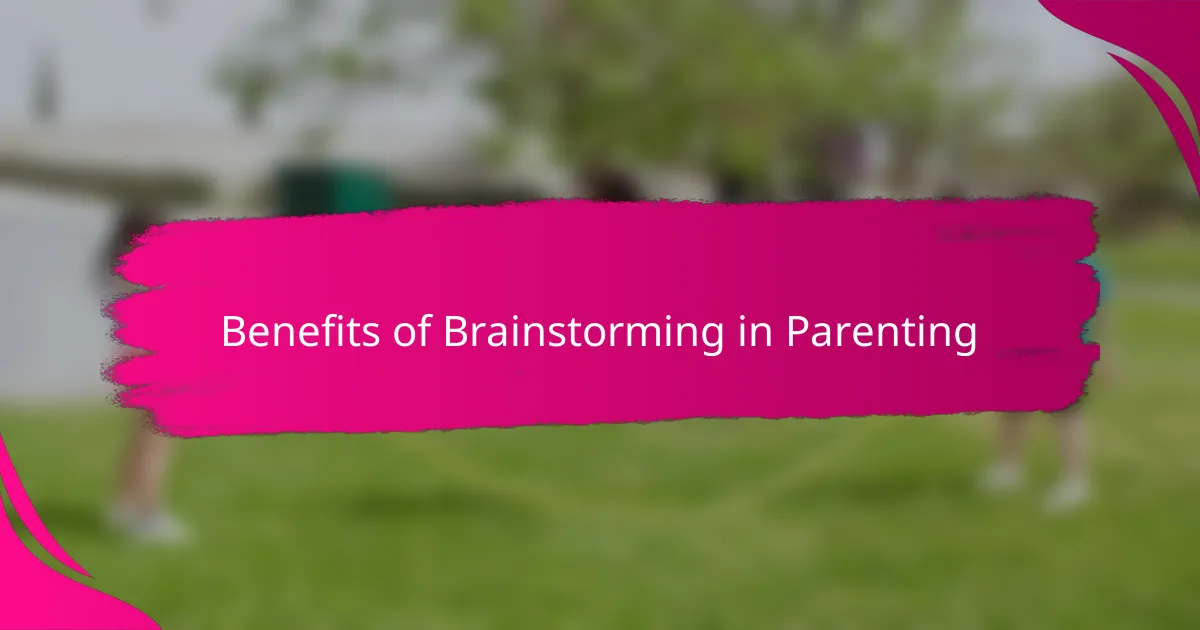
Benefits of Brainstorming in Parenting
Brainstorming in parenting has been a game-changer for me because it turns scattered worries into focused plans. When I jot down all the “what ifs” and ideas, suddenly the overwhelming noise quiets down. Have you noticed how just putting thoughts on paper—or on a screen—can make problems look smaller and more solvable?
One benefit I’ve found especially meaningful is how brainstorming opens the door for creative solutions I wouldn’t have thought of otherwise. Sometimes, when I sit quietly and map out everything, a new idea or a fresh perspective just pops up, like an “aha” moment that changes how I approach a challenge. It’s comforting to know there’s always more than one way to tackle parenting puzzles.
Also, brainstorming invites collaboration, which I can’t stress enough. When I involve my partner or even my kids in the process, it feels like we’re all on the same page, sharing the load together. Have you ever experienced that sense of relief when parenting stops feeling like a solo mission? Brainstorming builds that connection—and that support—naturally.
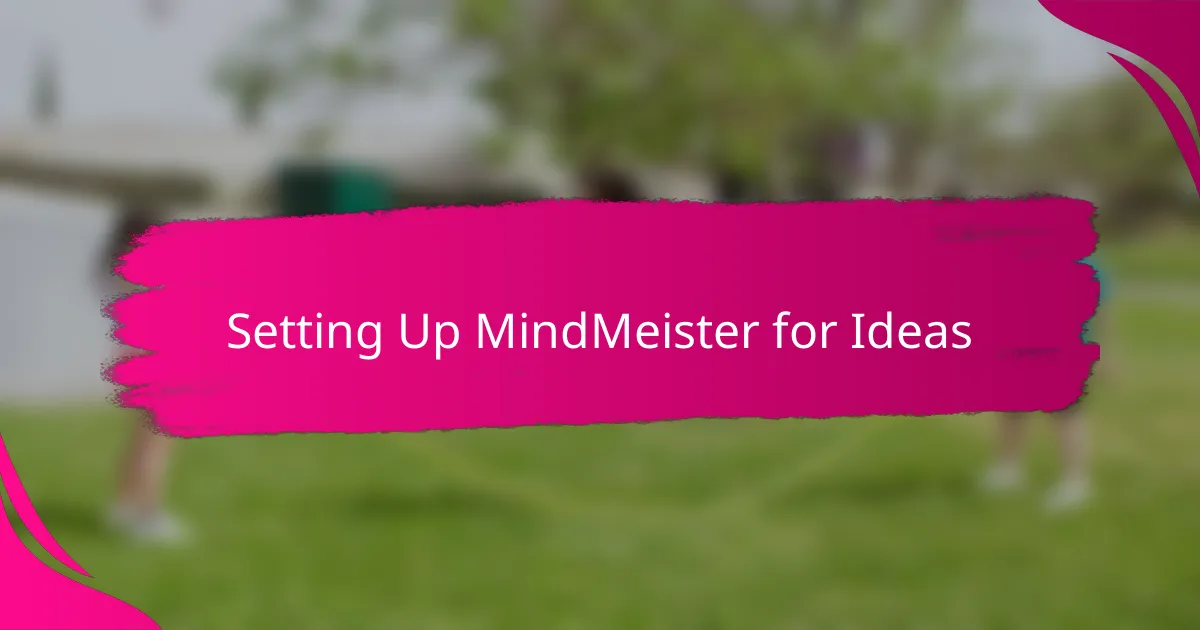
Setting Up MindMeister for Ideas
Setting up MindMeister for ideas was surprisingly straightforward, but what really made a difference for me was customizing the central topic to reflect my parenting goal. Have you tried starting with a blank canvas and felt lost? Giving that main node a clear label, like “Family Routines” or “Weekend Plans,” helped me focus immediately.
I also discovered that color-coding branches became a subtle game-changer. For example, I used blue for meal ideas, green for activities, and red for urgent tasks, which made scanning the map less overwhelming. It’s a small detail, but it transformed a jumble of words into something visually digestible and even calming.
Another trick I stumbled upon was adding icons and images next to ideas to make the map feel more personal and engaging. Seeing a little fork icon beside meal prep plans or a book icon near bedtime stories gave me a quick visual cue each time I revisited the map. Don’t underestimate how these tiny touches can bring your brainstorming to life and keep you coming back for more.
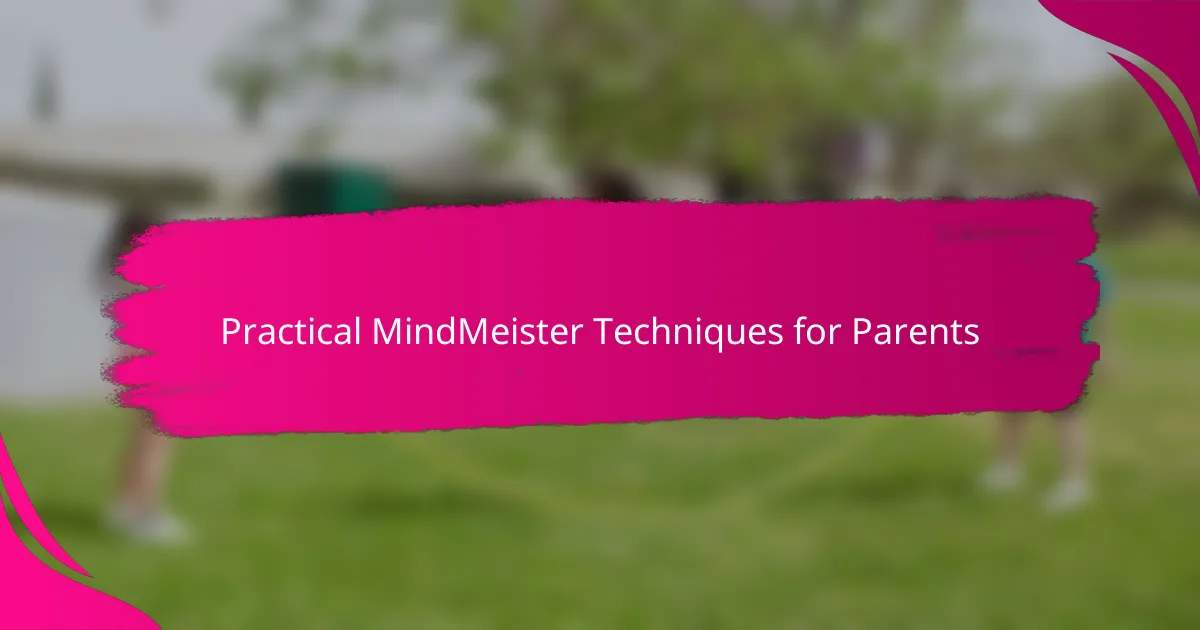
Practical MindMeister Techniques for Parents
One technique that helped me tremendously was using MindMeister’s collaborative feature. Inviting my partner to add his thoughts or update plans took a huge weight off my shoulders—and it instantly made us feel more connected in managing family life. Have you tried co-creating a mind map with someone? It changes the whole dynamic, turning solo stress into teamwork.
Another practical tip I found is breaking down big parenting projects into smaller, color-coded tasks. For example, when planning a birthday party, I created branches for decoration, guest list, and food prep, each with its own color. This not only made the whole thing manageable but also gave me a sense of accomplishment as I checked off each section.
Finally, I can’t recommend enough setting reminders linked to specific MindMeister nodes. When a playdate or doctor appointment sneaks up on me, a quick glance at the map’s notifications keeps me from scrambling at the last minute. Hasn’t that kind of gentle nudge saved you in hectic moments, too? It’s like having an extra pair of eyes watching out for you.
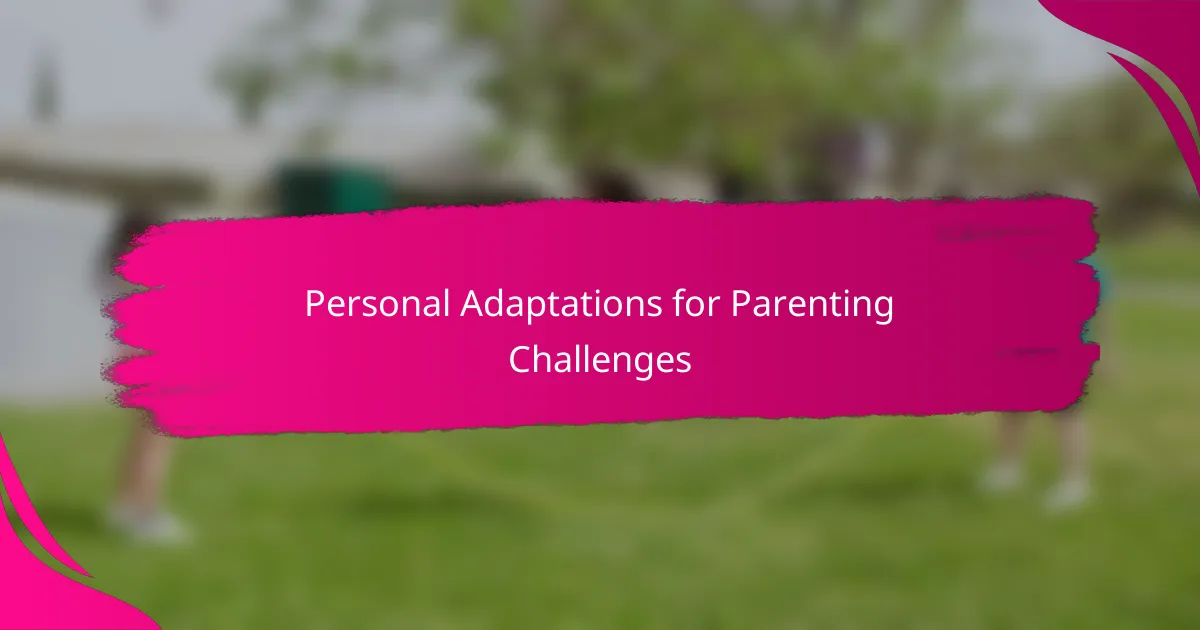
Personal Adaptations for Parenting Challenges
Parenting throws unexpected curveballs at you daily, and adapting MindMeister helped me tackle those in a way that feels less chaotic. When my toddler suddenly developed picky eating habits, mapping out mealtime alternatives and involving my partner in the process made brainstorming solutions feel like a team effort rather than a solo struggle. Have you ever felt that relief when an overwhelming challenge suddenly shrinks into manageable parts? That’s exactly what this tool brought me.
One thing I’ve learned is that flexibility is key. Some days, I just need a quick snapshot of priorities; other days, I dive deep into details. MindMeister’s ability to expand or collapse branches allowed me to zoom in or out depending on the challenge at hand—whether it’s juggling school projects or planning weekend family activities. This adaptability felt like a personalized parenting assistant helping me stay grounded.
Sometimes, I find that jotting down emotions alongside tasks—like noting a child’s anxiety about a new school or excitement for a birthday—adds an important layer. It reminds me that parenting challenges aren’t just about logistics but also about recognizing feelings. Have you tried blending practical planning with emotional awareness? That balance has made my approach far more compassionate and effective.
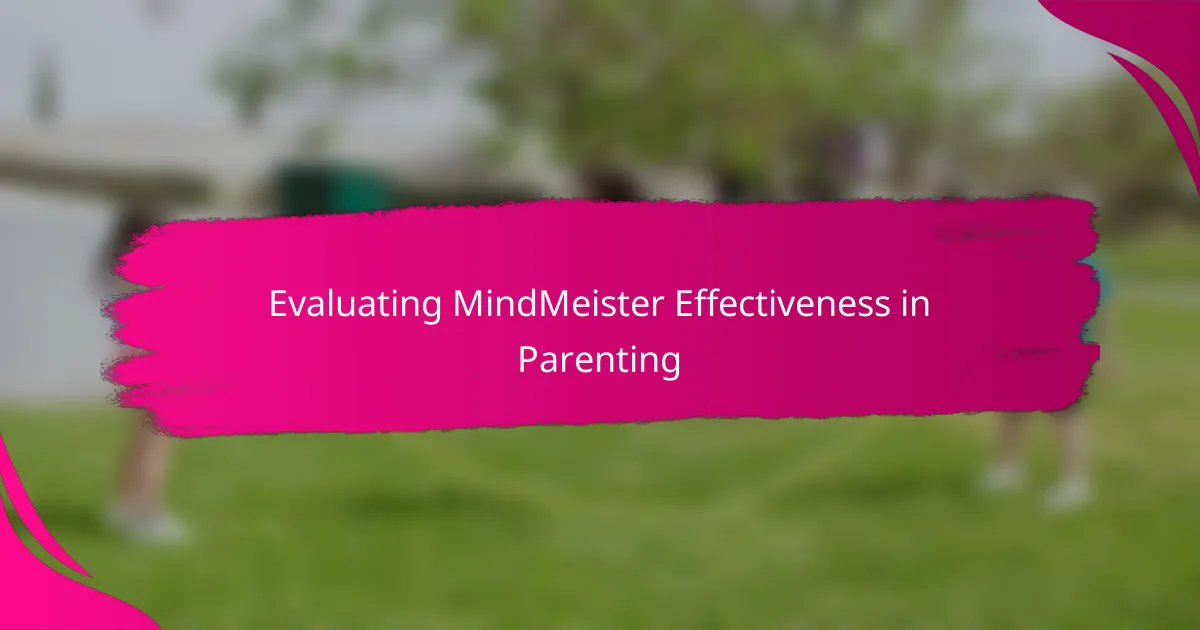
Evaluating MindMeister Effectiveness in Parenting
Evaluating MindMeister’s effectiveness in parenting, I’ve found it’s more than just a tool—it becomes a trusted partner in the chaos. Have you ever struggled to track everything from doctor appointments to school events? For me, seeing all those details laid out visually reduced anxiety and gave me a clearer sense of control.
It’s interesting how MindMeister encourages ongoing reflection, too. When I revisit my maps, I spot patterns or priorities I might have missed before, like realizing we needed more family downtime or better meal planning. Doesn’t that kind of insight feel like a mini breakthrough in everyday parenting?
What really stands out is how this digital mind mapping adapts to real life’s unpredictability. I remember a week when plans constantly changed, and collapsing or expanding branches let me shift focus without losing track. That flexibility made me realize MindMeister doesn’t just organize ideas—it supports the emotional ups and downs of parenting.
